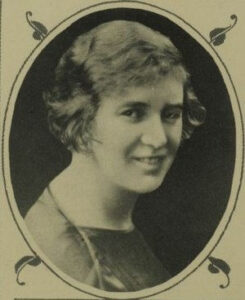
Born in 1885, in Kilkhampton, Cornwall, Minnie’s early years involved regular moves as her Wesleyan Minister father, William, travelled the country with his wife Rose and family. At 16 Minnie was in Haverfordwest where she was educated at Tasker’s High School for Girls, where she took her London Matriculation (1st class). She went to Cardiff University for two years undertaking a Normal [Teaching] Course.
Minnie became an elementary school teaching assistant in Brynmawr where she worked for 10 years and gained her insight into Welsh industrial conditions. Her outlook was the Christian, Methodist, approach to Socialism rather than anything as strident as violent revolution. Along with this was involvement with women’s equality and pacifism. Minnie was also an elocutionist and an accomplished pianist,
By 1914 she was President of the Monmouthshire Independent Labour Party. She was the first woman to achieve such a rank. At the 23rd ILP Conference at Norwich in 1915 she catches the attention of no less than Keir Hardie who said she made “the speech of the Conference, upon whom she burst like a new meteor on the horizon”
By 1918 she was the Secretary and main organiser of the No-Conscription Fellowship in Wales. This was an umbrella group supporting the cause of Conscientious Objectors. The coming of peace gave no let up to her efforts and in 1919 she was addressing meetings each night from Tuesdays to Saturdays in South Wales, setting up ILP branches as she went. The Llanelli Star had her as ‘Wales’ Great Woman Orator’.
In 1922 Ramsey MacDonald successfully stood in Aberavon at that year’s general election. His election agent was Minnie and they formed a lifelong friendship. At this time Minnie fledged into national politics and in December 1923 she stood in the general election for the seat of Bournemouth. She achieved nearly 20% of the poll. The next year she stood in the October general election and she increased her vote to more than 27%.
In 1926, the year of the General Strike, she was listed to be Labour’s candidate in the by-election at Faversham in Kent. She was also on the National Administrative Council of the ILP and also was a member of the National Executive of the Labour Party alongside, among others, George Lansbury; Herbert Morrison, Hugh Dalton and Ramsay Macdonald.
.
As Minnie reached senior positions within the ILP and Labour Party and as her national impact was just beginning to be felt, her health gave out. In 1926 a Harley Street consultant told her that she must give up the political life forever and that she must become a cabbage for a year. The meteor that Keir Hardie saw bursting over the horizon burnt out in a little over a decade.
In 1932 her sister Gladys gained employment as the pharmacist and dispenser at the Old Town Surgery in Bexhill. She and Minnie set up home above the surgery at 4 High Street.
Settled in Old Town, Minnie wrote of her life in her book entitled “A Cabbage For A Year”, which was published in 1934.
Minnie maintained her interests and beliefs, but now on a local basis with involvement with the Bexhill Labour Party, Worker’s Educational Association, Lecture Society, Bexhill Musical Society, Moral Re-armament and the East Sussex Cripples Association. Minnie also travelled to London to broadcast on the BBC Home Service an occasional programme called ‘Minnie Pallister Speaks’.
By the late 1930s war was on the horizon. Her commitment as a pacifist was undiminished and she was in at the formation of the Peace Pledge Union and along with her sister they were members of the Bexhill Group. Minnie was in addition a member of the Union’s National Council.
In 1946 a new direction opened for Minnie. Woman’s Hour commenced broadcasting and she had a regular monthly slot right up to her death in 1960.
In 1957, her sister retired and the sisters moved across to 4 De La Warr Road. A house previously known as Greendale on the corner of Manor Road and De La Warr Road. Minnie died at Bexhill Hospital, carried away by pneumonia in 1960 and she was cremated at Hastings. At her service Stuart Morris, a PPU General Secretary recognised the importance of Minnie’s role as a sponsor of the Union and compared her to famous pacifists such as Sybil Thorndike, Aldous Huxley and Benjamin Britten.
There is the intriguing link that the comedian Spike Milligan based his Goon Show character Min – Minnie Bannister – on her.

